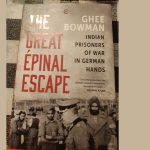THE SILENCE ON MILITARY LITERATURE
Bridging the Gap between Soldiers and Society
A common question many of my civilian friends ask me, for being a war veteran, is whether I felt scared in combat situations. My stock answer has always been that I was too busy for that, and that’s the gospel truth. Any man, who has ever been part of a tank crew in battle, would vouch for what I say. I’m sure combatants in other arms too would answer the question more or less in the same manner, unless someone is being hypocritical and wants to boast of possessing Napoleonic traits. I talk of tank crew because I was a tank soldier in the only war I saw. A tank crew, or any closely-knit military unit for that matter, function as a well-oiled piece of machinery, wherein each member plays his assigned role with perfection as trained, leaving no margin for error. It is such well-coordinated team work that reaps success in combat. It’s ‘one for all and all for one’ all the way. That does not offer a frontline soldier the luxury for sentiments like fearing for his life. He is too busy focused on what needs to be done. That’s the reality of soldiering, not the comics of jingoism and chest-thumping our moviedom and media projects. Indians are, by nature, hero worshippers. They applaud the ‘war heroes’ and fail to see the collective bravery, missing the forest for the trees.
Ignorance about and apathy towards armed forces, except in times of war when people go ballistic with patriotic fervour, is largely attributable to the near absence of war literature as a genre on India’s literary landscape. Unlike the West where works by soldiers and war correspondents often hit the best seller list, war literature is almost unheard of in India. Pulp fiction, tearjerkers and allegory rule the roost. It’s not that we do not find good military writing in India. SIACHEN – Conflict Without End by Lt Gen V R Raghavan, TOP BRASS – A Critical Appraisal of the Indian Military Leadership by Brig H S Sodhi (Post IPKF Ops in Sri Lanka), and KARGIL – From Surprise to Victory by Gen V P Malik are some erudite pieces of war writing by veterans. Then there are some exceptional works by non-military writers like, FARTHEST FIELD – An Indian Story of the Second World War by Raghu Karnad, THE FORGOTTEN SENTINELS on the Sepoy Conquest of Southeast Asia by N Nedumaran, a Singapore-based Indian-origin author, and the series on counterterror ops, INDIA’S MOST FEARLESS by Shiv Aroor & Rahul Singh. However, the doyens of our literary field, perennially obsessed with humanities in their pretentious intellectualism, find war literature a genre meant for lesser mortals. No wonder we never find a war book winning a literary award. Coupled with our academician’s refusal to include military history in the school curriculum, we end up as a country full of people who view the men and women of our armed forces more or less as automatons who assume exaggerated proportions whenever there is a war, and not as real human beings in flesh and blood with their dreams and aspirations like anyone else.
A better understanding of the life in arms by people at large would surely help generate popular works of literature and arts based on armed-forces’ themes. A highly overlooked element of life in uniform, often lost in the aura created by all kinds of rhetoric, is humour, which overrides every other human trait in a soldier’s life, in both war and peace. Take this for instance: An outsider might look at the process of issuing identity discs to all soldiers at the eve of a war as an emotionally charged affair, because these discs are inscribed with the particulars of each soldier’s blood group and religion, so that the medicos can transfuse the right blood if he is wounded and if killed, his funeral rites can be performed according to his religion. But I remember, how hilarious the event went when we, young officers, were being issued these discs. “Are yaar, they are treating us like convicts on death row! How to do our funeral!!” Someone blurted out loudly bringing peals of laughter all round. Then there was this guy who quipped when ordered not to wear rank insignias, “Better carry enough sets of fresh underwear. At least when they strip your dead body, they would know you were an officer and a gentleman.”
Coming to combat situations, artillery shelling was a near constant when our tanks were out in the open in enemy’s range. The first time we came under fire, we were assembled near the squadron commander’s tank for a briefing. There was that unmistakable swish noise of a shell screaming overhead, which we had often heard from a distance at the forward concentration area. ”Shelling!” Someone shouted and everyone hit the ground, except the squadron commander, a veteran of earlier wars, who remained standing nonchalantly. “On your feet, the lot of you”, he barked and added as we were up and dusting ourselves. “If you hear that noise, the shell has overshot you. You will never hear the one that’s meant for you.” That was one lesson learned. And in the coming days we would encounter a lot of those passing shots and many others who fell short of us as well. We could see rounds that fell short kicking up puffs of soil in our foreground. Those rounds, the ones overshot or falling short, were indications that the enemy arty was ranging onto us and to ‘close down’, to close our hatches and withdraw into safety of the tank’s interior. There were occasions when ‘opened up’, head and shoulder out of the turret and busy on the map and radio crackling in my ears, I would miss these indications, when my operator beside me would tap my shoulder and warn me. My crew had coined an interesting term for the shelling. “Rishtedar aa gaya saab (Relative is here)” was their favourite phrase to mention the commencement of enemy shelling. You see, there was no excitement, no shouting, just a humorous hint and we all went closed down.
In fact, humour is one human trait that makes the soldiers not just bear the hardships, but actually enjoy those! It makes their bonding and camaraderie – what they fashionably call interpersonal relationship in B school lingo – so powerful, that they remain intensely nostalgic of the life in arms long after they hang up their boots. It is a universal trait shared by soldiers the world over. One of my unforgettable images of the 1971 War is that of a Punjabi friend of mine, gifted with a tremendous sense of humour, having a chit-chat with Pakistani soldiers taken prisoner. Even the Pakistanis seemed to have forgotten their unlucky state for a while.
Cornelius Ryan, in his famous book, ‘A Bridge Too Far’ records an episode of a US paratrooper sergeant pinned down behind a tree after having jumped down into the midst of German troops, with a German soldier, behind another tree, taking several potshots at him but not able to hit him. The sergeant recollected his thoughts during the ordeal years later “The s**of***tch must either be a damn poor shot or a Goddamn sadist.” Eventually they both manage to wound each other and end up dressing each other’s wound under cover of a tree. The same book narrates the story of a British major who insisted on carrying an umbrella always, reasoning that he often forgot password and with the umbrella for his English trade mark, he wouldn’t be mistaken for a German. Watching him walk around with his umbrella while arty shelling was going on, a young officer quips “That umbrella isn’t going to help, sir”. The major turns around and says, “Oh, my God, Bobbie, what if it rains!” The book, made into an equally famous movie, has a memorable scene of the commander of XXX Corps addressing his officers, before launching the ground offensive. “This is a story that you will tell your grandchildren”, he begins dramatically and then adds in a subdued tone “and mighty bored they would be.” And he takes a dig at the commander of the Guards Armoured Division spearheading the offensive on his cavalry officer’s attire that defied the regulations with abandon. “Joe, I have chosen you to lead, not just because of your experience and competence, but because of your colourful attire. Should the Germans take you prisoner, they are likely to think you are a peasant and let you go!”
That’s humour in uniform. When will our writers, movie makers and the public have a taste of it? Imagine, Stephen Crane, the young author of ’The Red Badge of Courage’, a work cited a foundational text in modern war novel, had never served in the army, but heard it all from veterans of the American Civil War. That’s learning, and the pundits of Indian literature could do with lots of that.






Capt Ramachandran has hit the nail on the head. Very interesting is the narrative about humour and bonding especially during combat. Its special, unique and the sometimes dark humour will be well understood by those who have donned olive greens. The number of books/ literature by mil personnel without jingoism is happily increasing ,especially after the Kargil war. Hope the readers and lit fests at large too will encourage the authors by involving this segment too. Would like to mention another book in mil writing in addition to books mentioned by Capt DPR. “WATERSHED 1967” by Probal Dasgupta. Gen Sagat’s… Read more »
Thank you Col Sundar. I picked out only random examples. There are many more, including Shiv Kunal Verma’ masterpiece on 1962 War, ‘The War That Wasn’t’.
A clear perspective. Its true that very few books on military history are found in our country despite having fought four wars since independence. It is also a fact that we are poor at documentation and writing accurate war diaries. We didn’t have war correspondents. And all our borders are in the North and East. The rest of the country doesn’t really see the military. Most haven’t even seen our borders and how the military is deployed. Is our military so forbidding to the common man ? Wars don’t interest them? Its time we instituted military studies in all our… Read more »
Thank you General for those generous endorsement of my views. As a wayward student who strayed into the army for my love for war literature, I feel the country is missing a genre so absorbing, because our intellectuals are caught in their fixations of what good reading is about.
Very interesting perspective, sir! There are many reasons for the lack of military literature in our country. One could probably be due to the wide gulf between civil and military – thanks to the political dispensation in India – leading to a wide grey gulf inbetween. Secondly, since recent years, the publications that people read were largely by soldier-scholars and very focused on hard-core military matters. The only lot who took it to the aam janta were movie makers with an intent of making good bucks through display of needless bravado interspersed with good measure of tear jerking sentiment. Probably… Read more »
Thank you for the candid analysis of the issue. The root cause lies with the way the profession of soldiering was perceived by the general public in India from the colonial times. For an ordinary Indian the rare specimen known as soldier was someone who chose a suicidal profession because he wasn’t capable of anything else (except maybe in the traditional recruitment bases like Punjab the British preferred). Also many had enlisted as labour and ordinary civilians could not distinguish between combatants and non-combatants, so much so, in regions like Kerala, the soldiers of the two world wars were referred… Read more »